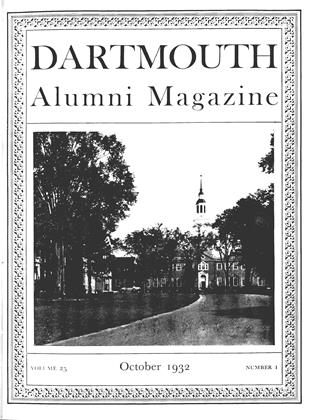By Edward Lindsey '94 (New York, ThomasY. Crowell and Co., 1931, pp. xix-347,index ).
This book is evidently designed to give the general reader the essential information concerning the Permanent Court of International Justice or "World Court. The author believes earnestly in the Court, but his aim is rather to tell the story of its founding and to describe its operation than to engage in extended argument as to its merits and the advisability of American adhesion. There are good introductory chapters on the nature and growth of international law and on earlier attempts to establish international courts. Mr. Lindsay regards the Court as one truly international in character, gradually developing and unifying international law through its decisions and advisory opinions, despite the fact that the Anglo-American principle of stare decisis is not recognized by it. As he sees it, attempts at the formal codification of international law should not be regarded as prerequisite to the successful operation of the Court. With time and the regular flow of cases the vague and the bare spots in customary international law will gradually be covered by the Court's decisions, which will become more authoritative as the Court gains in prestige. Customary law can best be developed by case law.
A valuable feature of the book is the concise, exact and reliable analysis of eighteen advisory opinions, and sixteen judgments rendered by the Court, though it is to be regretted that the book went to press too early to include the advisory opinion on the Austro-German customs union, which has recently been the source of much discussion and criticism.
Almost all the important documents concerning the Court are included in an appendix. The conditions and reservations of the several states adhering to the optional compulsory jurisdiction clause are omitted however, as is the important memorandum of Mr. Root to the U. S. Senate Foreign Relations Committee explaining the method by which it was sought to meet the Senate's "Fifth Reservation." There is an adequate index.
The book can be recommended as a vainable work of reference on the Court, in which the things one would like most to know are fairly, clearly, and interestingly presented.
 View Full Issue
View Full Issue
More From This Issue
-
 Article
ArticleCHANGE IS OPPORTUNITY
October 1932 By Ernest Martin Hhopkins -
 Class Notes
Class NotesClass of 1922
October 1932 By Francis H. Horan -
 Class Notes
Class NotesClass of 1911
October 1932 By Prof.Nathaniel G. Burleigh -
 Article
ArticleHANOVER BROWSING
October 1932 By Rees Higgs Bowen -
 Class Notes
Class NotesClass of 1902
October 1932 By Hermon W. Farwell -
 Class Notes
Class NotesClass of 1905
October 1932 By Arthur E. Mcclary
Books
-
 Books
BooksFACULTY PUBLICATIONS
December 1921 -
 Books
BooksSECONDARY SCHOOLS FOR AMERICAN YOUTH
June 1944 -
 Books
BooksTHE CANYON
November 1940 By Charles Bolte '41 -
 Books
BooksA BRIEF HISTORY OF MEDICINE IN MASSACHUSETTS.
MARCH 1931 By Frederic P. Lord -
 Books
BooksEGYPTIAN ASTRONOMICAL TEXTS: III DECANS, PLANETS, CONSTELLATIONS AND ZODIACS
JUNE 1969 By JOHN HURD '21 -
 Books
BooksMILLIONS OF BOOKS, THE STORY OF YOUR LIBRARY
July 1941 By Nathaniel L. Goodrich

